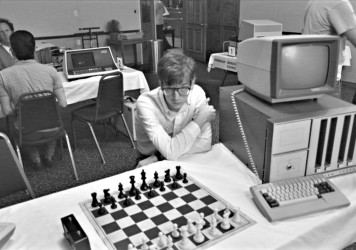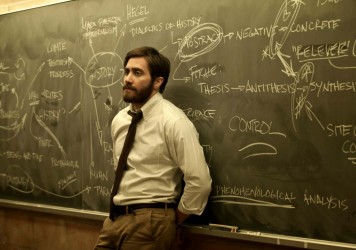French enfant terrible Leos Carax finally comes good with this sublime and surreal ode to acting, moviemaking, Paris and the whole damn thing.
Who knew? Leos Carax, dreamer, cinephile, over-reaching fabulist, chain-smoking torchbearer for the artistic ideals of the Nouvelle Vague of the ’60s and the cinéma du look of the ’80s, has finally made a film that’s worthy of his esteemed reputation. Though tempting to try and state in finite terms what Holy Motors is, it’s far too rich, mysterious and playful to cosily index. This is a loose-leaf odyssey that flies in the face of easy interpretation.
But we shall take a punt. Or at least offer a few readings of events. Take one: it’s a film examining the past, present and future of movie acting. A stultifying, superhuman performance from Carax muse Denis Lavant powers Holy Motors through its nine chapters (plus churning, accordion-driven entr’acte).
He plays the world-weary Monsieur Oscar, winding through Paris in a stretch Limo that’s being driven by Édith Scob – the masked human pin-cushion in Georges Franju’s 1960 masterpiece, Eyes Without a Face. Every time he steps outside for an ‘assignment’, he is transformed into a new scenario, a new story, inhabiting an entirely new body and soul.
First he’s a bag lady, then a motion capture stuntman, then a crackpot elfin sewer dweller with a wispy ginger beard who eats banknotes/fingers/hair, then a worried father picking up his daughter from a party, then a Chinese gangster, then assassin, etc. The film offers a window onto the joy and sadness of acting as an occupation, as Oscar flits between ‘characters’ while never having ample time to attend to and shape his own. A lesser talent than Carax may not have been able to flip between the comic, the tragic, the intimate and the extraordinary with such immaculate grace.
All the while, Holy Motors retains a seductive tinge of melancholy. It constantly reminds us of the man behind the mask as Oscar – with hacking cough and spiraling drink problem – knows that he’s not going to be able to do this ‘job’ forever. Which brings us neatly to another reading of the film, one related to the idea of technology and how difficult it is to adapt to rampant modernity.
In Lavant’s chameleonic performance, Holy Motors makes a plea for the simple joys of the organic. It romantically pores over Oscar’s careful application of make-up for each new life he creates. At numerous junctures it pokes fun at a dystopic future where gravestones cynically direct mourners to web profiles, cameras are invisible to the human eye and cars talk to each other about death anxiety.
There’s also an amazing scene inside the derelict Samaritaine department store in which crop-haired Kylie Minogue delivers a stirring musical number. The scene operates as a powerful lament for the doe-eyed sincerity of the MGM musical as well as this gorgeous, grand old Art Deco building that has been allowed to fall into ruin. Even the name Oscar can be read as a link to the superficial glamour of the Hollywood dream factory.
But then it could also – in the best traditions of Godard – be a metaphysical piece about the roles, responsibilities and reality-shaping capabilities of the film director. What can filmmakers do to transcend the strictures of genre? In this case, the answer is to quote rather than exploit. In the film’s mysterious prologue, Carax himself is seen falling out of bed then passing through a wall to the balcony of a picture palace. This film is a glimpse inside the inner-workings of his mind, and utterly pretentious though it may initially appear, it’s a move which, in the end, only adds layers of credible ambiguity to the delirious proceedings.
In the end, Holy Motors could also be seen as a very sad film about the onslaught of death. Monsieur Oscar’s shape-shifting mystery tour of Paris is itself a metaphor for the variety of life’s experience and the crushing fact that it’s all over too damn swiftly.
Published 27 Sep 2012
Carax has been ominously quiet since 1999’s sporadically amazing folly, Pola X.
Holy shit! That rare thing in cinema: something entirely new.
A journey you’ll need to take over and over to truly discover its beguiling depths.

Actor Steve Oram has decided to make a movie, and the results are spectacularly disturbing.

Andrew Bujalski switches gears with a lo-fi marvel that channels the spirit of Robert Altman.

Jake Gyllenhaal sees his double and enters a vortex of wanton weirdness in this cold, experimental drama.